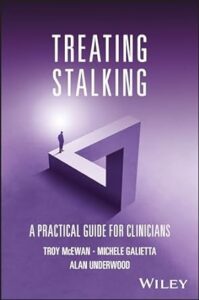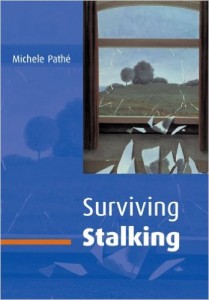Research
The authors of the Stalking Risk Profile have been involved in research into stalking, its perpetrators, and its victims for over 30 years. Key findings from this research include some of the first studies of stalkers psychological characteristics1, 2; a seminal study describing the impact of stalking on victims3; one of the first detailed epidemiological studies of stalking in the world4; and a number of important studies identifying risk factors associated with various kinds of stalking outcomes5,6,7. They have also been responsible for a large body of research into public figure stalking, harassment and risk assessment8. This research has underpinned to three books on various aspects of stalking, in addition to the SRP.
Stalkers and their Victims (2000/2009). Surviving Stalking (2002)

The SRP authors are involved in a range of current research into stalking, continuing to move this important literature forward. Details of recent and ongoing research projects are on the ‘Current Research’ page linked at the right of the page.
1 Mullen, Pathé, Purcell & Stuart (1999). Study of stalkers. American Journal of Psychiatry, 156(8)
2 MacKenzie, Mullen, Ogloff, McEwan & James (2008). Parental bonding and adult attachment style in different types of stalkers. Journal of Forensic Sciences, 53(6)
3 Pathe & Mullen (1997). The impact of stalkers on their victims. British Journal of Psychiatry, 170(1)
4 Purcell, Pathe & Mullen (2002). The prevalence and nature of stalking in the Australian community. Australian and New Zealand Journal of Psychiatry, 36(1)
5 McEwan, Mullen & Purcell (2007). Identifying risk factors in stalking: A review of current research. International Journal of Law and Psychiatry 30(1)
6 McEwan, Mullen, MacKenzie & Ogloff (2009). Violence in stalking situations. Psychological Medicine 39(9)
7 McEwan, Ogloff & Pathe (2011). Advances in stalking risk assessment. Behavioral Sciences and Law 29(2)
8 For a summary and links to this research please visit the Fixated Research Group website



